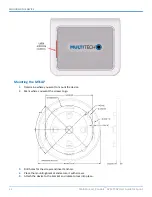
GETTING STARTED WITH MLINUX MODELS
MultiConnect
®
Conduit
TM
AP MTCAP User Guide for Sprint
19
# Dial the connection (using /etc/ppp/peers/xxx# config)
# pppd call xxx#
(where xxx# is your radio, LSP3 for Sprint)
2.
Use the Linux
route
utility to verify ppp0 is up.
# route
Kernel IP routing table
Destination Gateway
Genmask
Flags
Metri
c
Ref
Use
Iface
default
33.140.12.1
8
0.0.0.0
UG
0
0
0
ppp0
33.140.12.1
8
*
255.255.255.25
5
UH
0
0
0
ppp0
192.168.2.0 *
255.255.255.0
U
0
0
0
ethp0
The Linux
ifconfig
utility can be used to inspect the ppp0 interface details.
# ifconfig ppp0
ppp0
Link encap:Point-to-Point Protocol
inet addr:33.140.12.18
P-t-
P:33.140.12.18
Mask:255.255.255.255
UP POINTOPOINT RUNNING NOARP MULTICAST
MTU:1500
Metric:1
RX packets:7 errors:0 dropped:0 overruns:0 frame:0
TX packets:8 errors:0 dropped:0 overruns:0 carrier:0
collisions:0 txqueuelen:3
RX bytes:106 (106.0 B)
TX bytes:145 (145.0 B)
Additionally, you can view the
pppd
logs in
/var/log/messages
to see the modem dialing and assigned IP
address or errors if the connection was unsuccessful.
To Stop a PPP Connection
# send SIGTERM to pppd, which causes it to hang up and exit cleanly
# killall pppd
Starting Cellular Connection on Boot
Automatically starting pppd on boot requires (1) setting the peer file to use and (2) telling the system to run the
ppp init script on boot.
1.
To see the available peers files () to set the peer file, issue:
ls /etc/ppp/peers
2.
Edit
/etc/ppp/ppp_on_boot
(with vi or sudo) and change:
#PPPD call provider
to your desired provider (where xxx# is your radio, LSP3 for Sprint.)
#PPPD call xxx#
3.
Manually start the init script and check your Internet connection to test your change.
ppp_on_boot




























